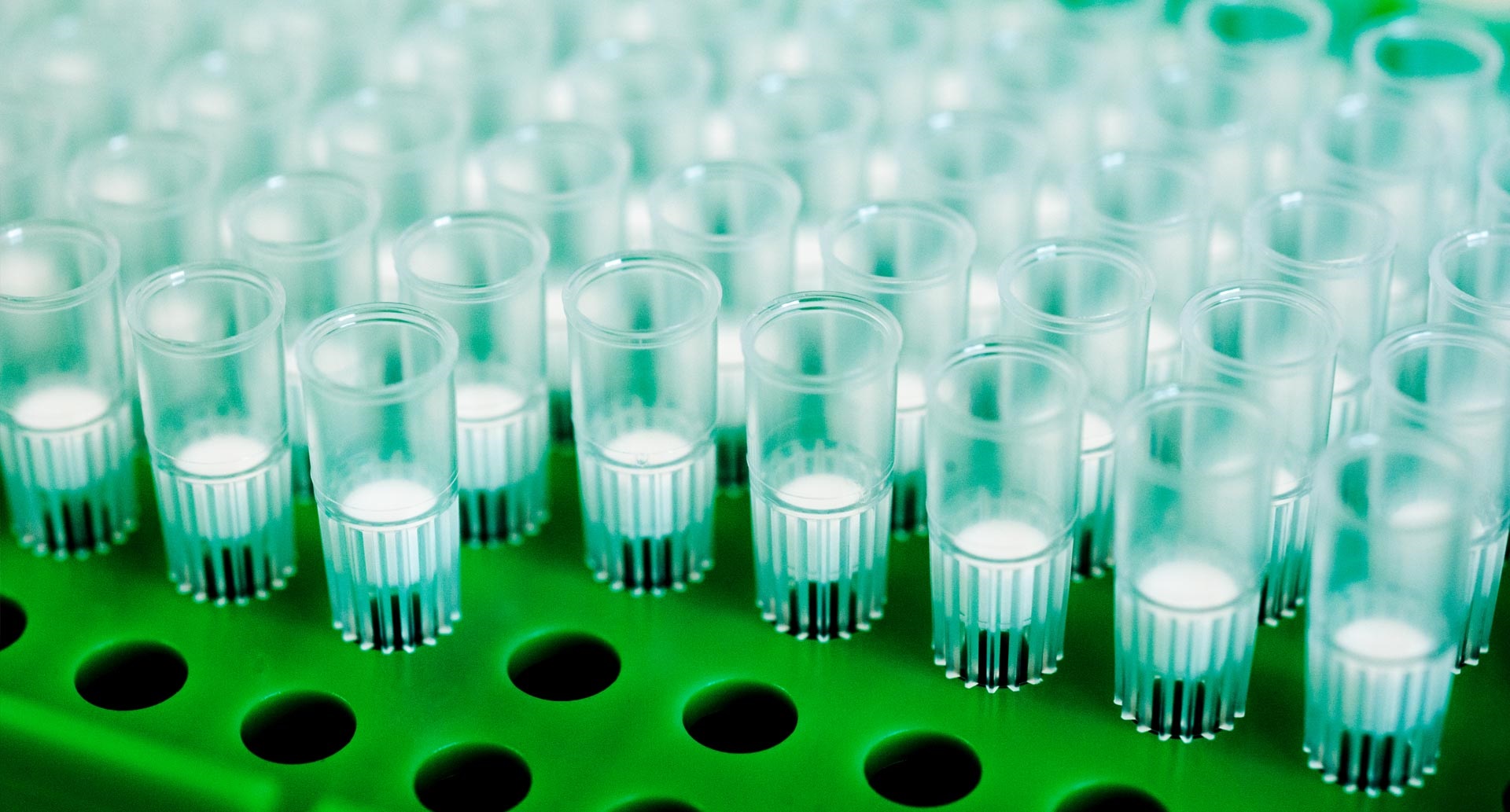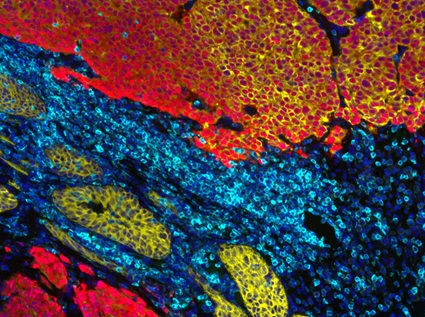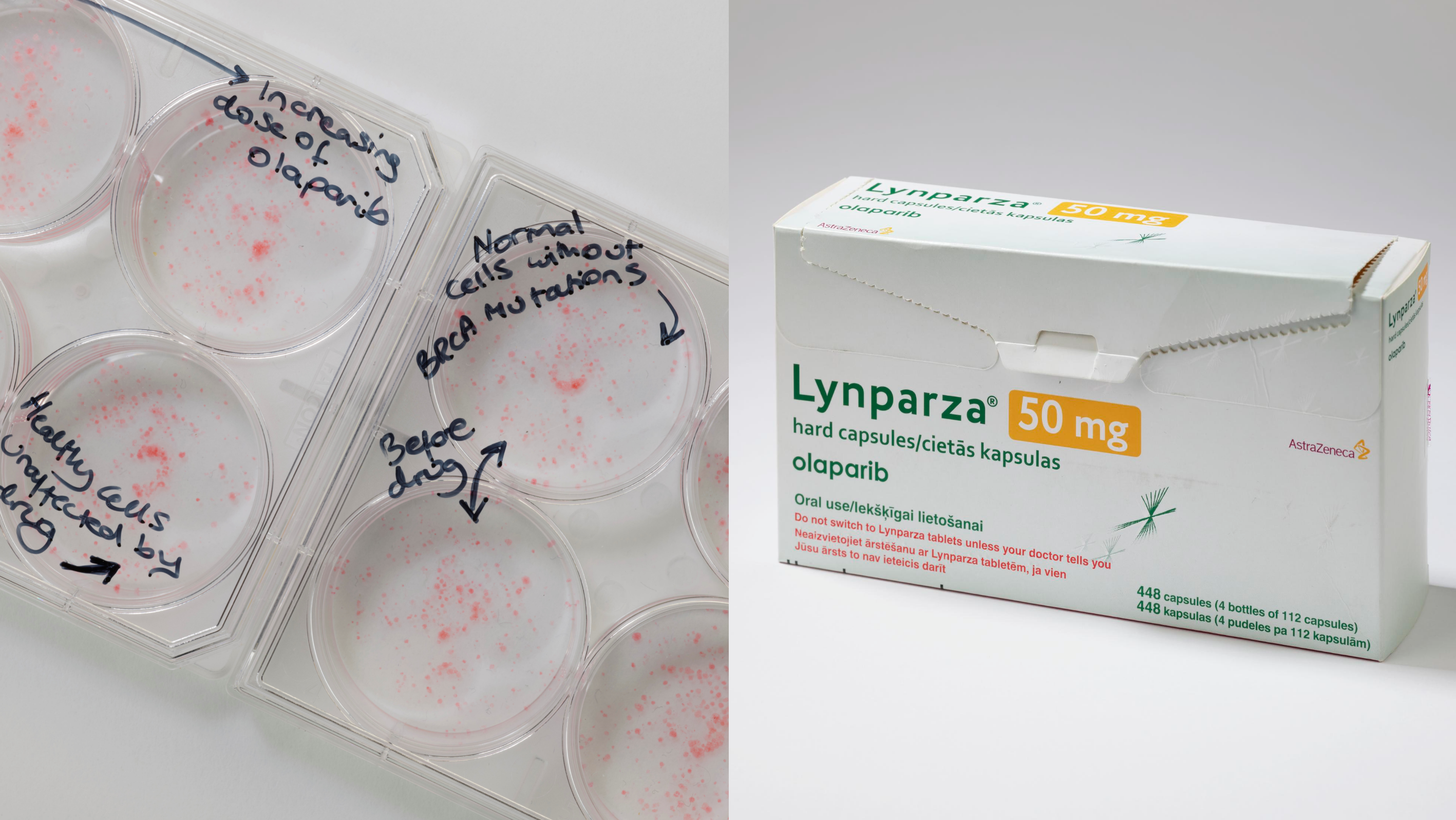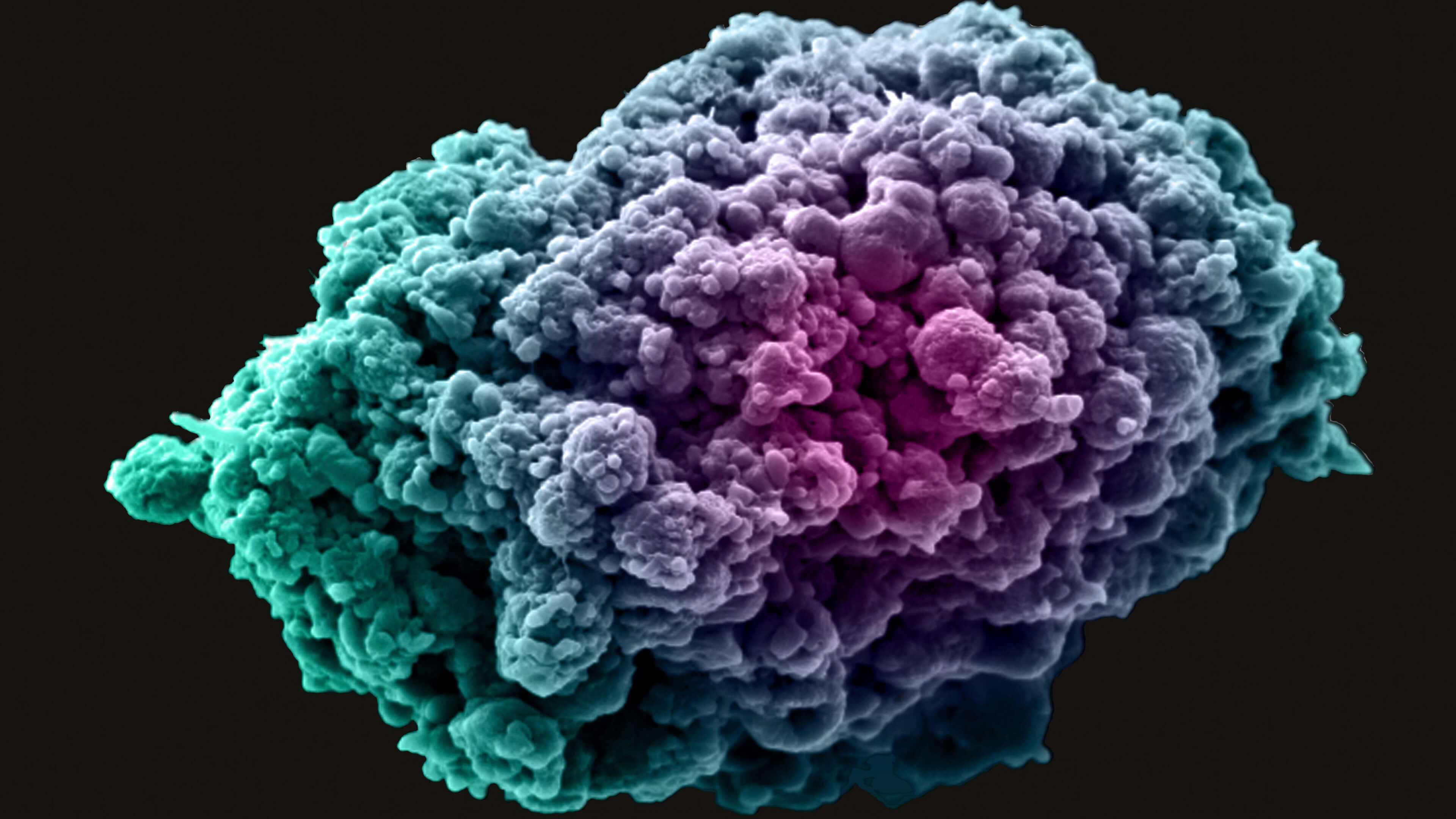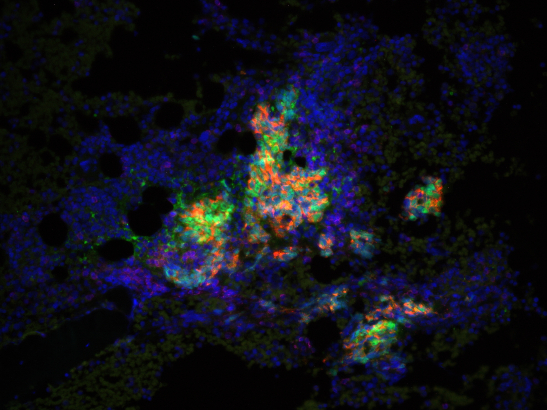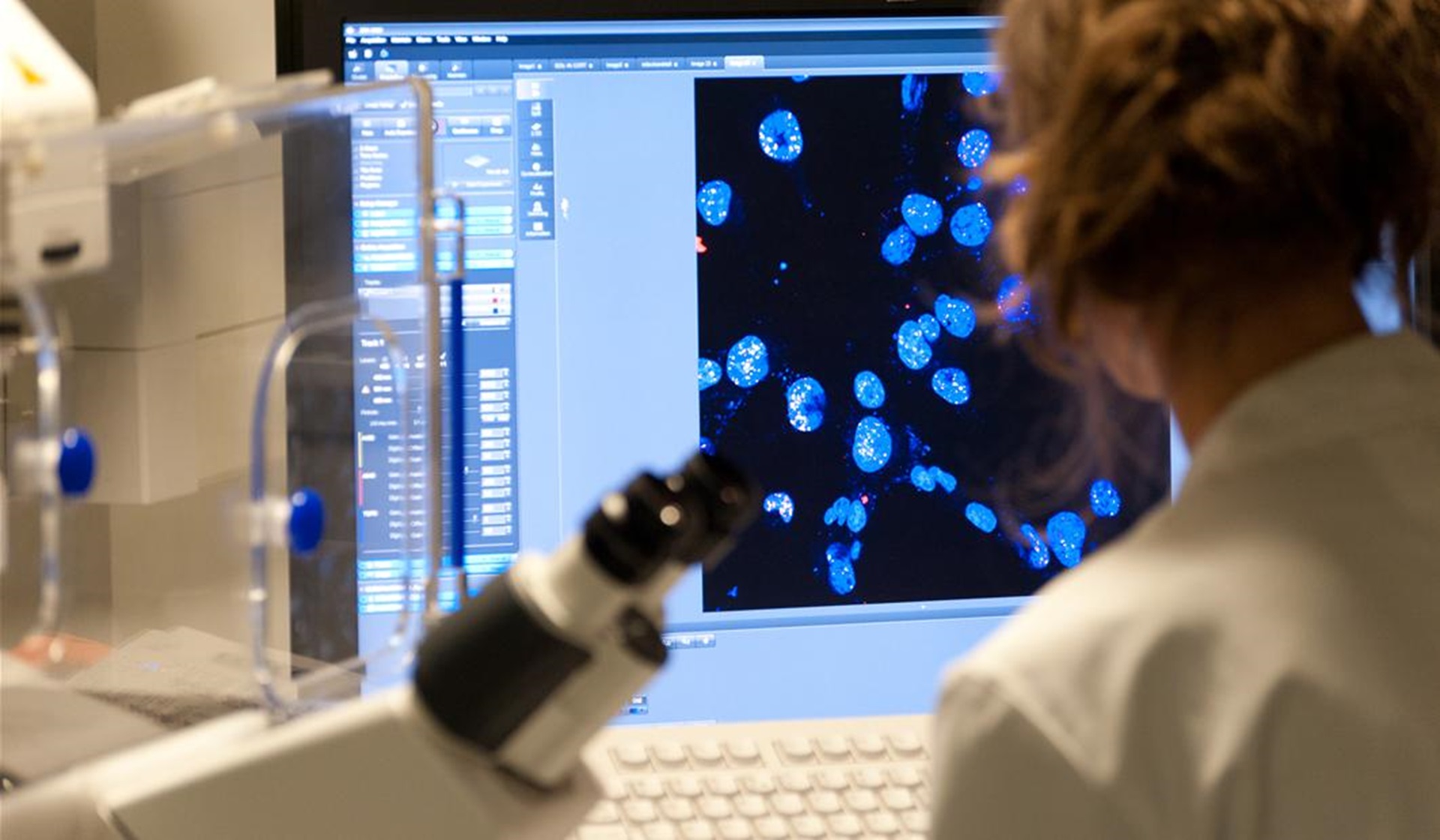Centre for Genome Stability
at the ICR and The Royal Marsden
Centre for Genome Stability (CGS) is a unique multidisciplinary programme bringing together experts from across the ICR and The Royal Marsden who work on DNA-damage response and genome instability research with clinical experts in the treatment of cancer.
How we research at this centre
Our world-leading centre of excellence aims to understand genetic, epigenetic and proteomic changes to genomic stability in the development of cancer in order to develop biomarkers and therapeutic targets for improved cancer treatment. This will allow us to apply multidisciplinary approaches to address important research questions, thus accelerating discoveries into the causes of tumorigenesis and delivering major clinical impacts, both nationally and internationally.
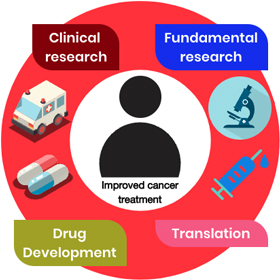
We aim to harness the breadth of expertise in genomic stability at the ICR to develop new and better therapies against cancer to make the most meaningful impact in clinics.
The centre will establish a single-domain antibody screening facility to generate DNA-repair related biomarker detection and intracellular antibody protein perturbation tools.
The Centre's main themes are as follows:
Molecular Mechanisms of Genome Stability Maintenance
Maintenance of genome stability is accomplished throughout the cell cycle by a complex network of proteins referred to as the DNA-damage response (DDR) pathways. Mutations in DDR factors are associated with elevated cancer predisposition. Understanding this will allow us to target tumour-specific DDR dependencies for improved cancer treatments.
Understanding Replication Stress Responses
Cells control DNA replication with the highest possible fidelity in order to prevent catastrophic changes to their genome. Understanding how DNA replication and repair machineries function and how these processes differ in cancer cells could provide new prognostic tools and therapeutic targets.
Integrative Systems Biology of Cancer and Ageing
We will develop tools to interrogate large data sets of genetic, genomic and proteomic information to generate hypotheses for experimental analysis, with the ultimate goal of understanding the changes that occur to the genomes and proteomes of cells as they transition to a cancerous or aged state.
Genome Instability and Cancer Therapeutics
New dependencies within the DDR pathways may represent targetable vulnerabilities in cancer cells, with a major focus on synthetic-lethal interactions and over-reliance on DDR pathways allowing for selective killing of cancer cells.
We want to accelerate the translation and delivery of our research.
As one of the world’s most influential cancer research institutes, we discover more new cancer drugs than any other academic centre in the world. We have made game-changing discoveries that revolutionised the way cancer is studied and treated.
Work with us in the Centre for Genome Stability to develop and commercialise our novel discoveries to defeat cancer. Contact us at [email protected] to work with us.
Internal collaborative opportunities
The Centre supports activities to bring together genome stability expertise across the ICR and The Royal Marsden in order to support and develop new collaborative opportunities.
Centre short talk series
Participate in our series of short talks and hear from colleagues. Next event is expected to take place in October 2024. Further details TBC.
Single-domain Antibody Facility
We have established our Single-domain Antibody Facility with ongoing pilot studies. There will be a call for screening projects.
Requirements to access the facility
Protein/antigen concentration of 500µg – 1mg, with objective of antibody for advice on tag (i.e. denatured/native form of protein). Final validation to be undertaken by research teams due to limited capacity within the facility. If you are interested to find out more, please contact Dr Divya Duscharla at [email protected].
Clinical Research Fellowships
Colleagues across the ICR and The Royal Marsden can apply to appoint Clinical Research Fellows (3-year PhD), addressing a reverse translation topic (bed-to-benchside) and involving clinical and fundamental research labs.
We are now accepting outline project proposals from potential supervisors for the next round of Clinical Research Fellowships for 2025/26 entry.
Please contact [email protected] to express your interest or if you have any questions.
Our researchers at this centre
Fundamental research
Biography
Professor Paul Workman FMedSci, FRS was Chief Executive and President of The Institute of Cancer Research (ICR) from 2014 to 2021.
Professor Workman is a passionate advocate of personalised molecular medicine and is an enthusiastic practitioner of multidisciplinary cancer drug discovery and development approaches to 'drugging the cancer genome'. He also conceptualised the 'Pharmacological Audit Trail' approach.
As well as establishing and successfully leading drug discovery project groups yielding clinical candidates, Professor Workman’s personal and collaborative research utilises molecular pharmacology and chemical biology approaches, including high-throughput and genome-wide as well as hypothesis-driven strategies, to interrogate cancer biology, identify and validate new drug targets, discover and develop chemical tools and drugs acting on these targets, identify predictive and mechanism of action biomarkers, and elucidate mechanisms of drug sensitivity of resistance.
He is especially interested in exploiting the addictions, vulnerabilities and dependencies of cancer cells using a combination of small molecule tools and drugs alongside molecular genetic techniques.
Professor Workman has successfully built a series of multidisciplinary drug discovery and development groups in the academic, large pharma and biotechnology company sectors. Through this experience he has been able to combine the best elements of each of these environments. He has been responsible for the discovery of a number of drug development candidates, including in particular pathfinding inhibitors of the HSP90 molecular chaperone and the PI3 kinase family of signalling enzymes.
Professor Workman completed his BSc in Biochemistry at the University of Leicester UK (1973) and his PhD in Cancer Pharmacology at the University of Leeds UK (1977). In 1976 he moved to the Medical Research Council's Clinical Oncology Unit in the MRC Centre, University of Cambridge UK where he established a preclinical and clinical cancer pharmacology laboratory. He developed his early career in Cambridge from 1976 to 1990, focusing mainly on drugs designed to exploit tumour hypoxia and contributing to the discovery and clinical development of several hypoxia-targeted agents, leading to a tenured professorial level appointment.
Following a brief sabbatical at Stanford University and Stanford Research International in Palo Alto, California USA in 1990, Professor Workman was appointed as Cancer Research Campaign Professor of Experimental Cancer Therapy and Director of Laboratory Research in the Department of Medical Oncology, Beatson Laboratories, University of Glasgow UK.
In 1993, Professor Workman moved to a senior scientific leadership position in AstraZeneca Pharmaceuticals, where he was Head of the Cancer Research Bioscience Section at the Alderley Park site in Cheshire UK. He also initiated and led AZ’s biotechnology collaboration with Sugen, San Francisco USA.
In 1997, Professor Workman moved to ICR to take over and build up what is now the Centre for Cancer Drug Discovery, and held the position of unit Director until January 2016 - a period of over 18 years. Under his leadership, the Unit has identified 20 clinical drug candidates since 2005, has progressed 11 of its drugs into Phase I clinical trials in ICR’s partner Royal Marsden Hospital, and has seen its prostate cancer drug approved by the US FDA, European Medicines Agency and NICE and successfully launched.
Many of the Unit’s drug discovery projects have been partnered with biotech companies. In addition, Professor Workman was a scientific founder of Chroma Therapeutics in 2000 and of Piramed Pharma in 2002, the latter being acquired by Roche in 2008.
Honours and prizes include: Fellow of the Royal Society (elected in 2016), UICC ICRETT Fellow, Cancer Research UK Life Fellow, Fellow of the Academy of Medical Sciences, Fellow of the Royal Society of Chemistry, Fellow of the Royal Society of Medicine, Fellow of the Society of Biology and Member of the Faculty of 1000. Professor Workman has received the European School of Oncology Award for Excellence in Oncology Research, NDDO Award for Cancer Drug Development, ICON Distinguished Lecture, Bruce Cain Memorial Lecture of the New Zealand Cancer Society and NCRI/BACR Tom Connors Award Lecture.
In 2009 he received an Honorary DSc from the University of Leicester and the Royal Society of Chemistry George and Christine Sosnovsky Award in Cancer Therapy for “his seminal research on the role of chaperone proteins in cellular processes and the application of this knowledge at the forefront of anti-cancer drug discovery”. In 2012, Professor Workman was once again honoured by the Royal Society of Chemistry, this time with the organisation’s Chemistry World Entrepreneur of the Year Award in recognition of his success at taking pioneering drugs out of the laboratory and into commercial development for the ultimate benefit of patients worldwide. RSC President Professor David Phillips cited Professor Workman for his “work as a scientific pioneer and serial entrepreneur whose numerous commercialised discoveries and academic research led to his founding two successful chemical companies: Piramed Pharma and Chroma Therapeutics".
Professor Workman also led the group that received the American Association for Cancer Research’s 6th Team Science Award 2012. The citation for this prestigious Award said: “This team’s research is an outstanding example of how innovative cancer research conducted by a highly functioning translational team can start with biologic hypotheses and ultimately lead to much-needed cancer therapeutics.” The Award citation also highlighted the group’s discovery of 16 therapeutic drug candidates over the past six years. Six of these candidate drugs, which include highly innovative inhibitors of the molecular chaperone heat shock protein 90 (HSP90), phosphatidylinositol 3-kinase (PI3K), protein kinase B/AKT, and cyclin-dependent kinases (CDKs), have now entered clinical trials. The 16-member group also carried out pioneering preclinical work on BRAF and its inhibitors, and discovered CHK1 and dual Aurora/FLT3 inhibitors.” Further highlighted in the citation was that “this team’s many research accomplishments include the discovery and development of abiraterone.” The AACR Award citation went on to say: “Overall, the work carried out by this multidisciplinary team over the last six years provides an outstanding example of the non-profit cancer drug discovery and development model that they have pioneered, as well as exemplifying a meritorious ability to collaborate productively with industry to accelerate patient benefit.”
In December 2015, the ICR was presented with the British Pharmacological Society’s UK Pharmacology on the Map award for institutions that have made a significant contribution to improving human health through drug discovery and pharmacology research. Professor Workman was presented the award by Stephen Metcalfe MP, Chair of the Parliamentary and Scientific Committee. Professor Workman said: “We are delighted to be given this accolade from the British Pharmacological Society in recognition of our work in the discovery and pharmacology of cancer drugs. The ICR has been at the forefront of discovering innovative new cancer treatments for decades, with many of our drugs in use worldwide today."
In 2017, Professor Workman was recognised by his alma mater, the University of Leeds, with an Honorary DSc. He was also awarded an Honorary Fellowship from the University of Cumbria in Carlisle. Professor Workman serves as a member of the Athena SWAN steering group.
Professor Workman has published over 470 research articles and edited several books and journal issues on cancer drug development. He has also chaired a number of significant committees and been an adviser to many research institutions as well as pharma and biotechnology companies.
Professor Workman also has a personal biography.
BSc (Hons) Biological Sciences, University of Leicester.
PhD Cancer Pharmacology, University of Leeds.
FSB, Fellow of the Society of Biology.
FMedSci, Fellow of the Academy of Medical Sciences.
DSc (Hon), University of Leicester.
FRSC, Fellow of the Royal Society of Chemistry.
PhD Molecular Pharmacology, The Institute of Cancer Research.
Award for Excellence in Oncology Research, European School of Oncology, 1985.
ICRETT Fellowship, UICC, 1990.
Life Fellowship, Cancer Research Campaign, 1991.
Bruce Cain Memorial Award Lecturer, New Zealand Society for Oncology, 2003.
Honorary Award for Cancer Drug Discovery and Development, Dutch New Drug Development Office, 2006.
ICON Distinguished Lecturer, University of Manchester, 2007.
Tom Connors Award Lecturer, British Association for Cancer Research, National Cancer Research Institute, 2009.
George & Christine Sosnovsky Award, Royal Society of Chemistry, 2010.
Bruce Cain Memorial Lecturer, New Zealand Society for Oncology, 2011.
AACR Team Science Award (Team Leader), American Association for Cancer Research, 2012.
Chemistry World Entrepreneur of the Year, Royal Society of Chemistry, 2012.
Cancer Research UK Translational Cancer Research Prize (Joint Team Leader), Cancer Research UK, 2013.
Fellow of The Royal Society (FRS), The Royal Society, 2016.
Fellow of the European Academy of Cancer Sciences, The European Academy of Cancer Sciences, 2014.
Fellow of the Academy of Medical Sciences (FMedSci), The Academy of Medical Sciences, 2002.
Fellow of the Royal Society of Medicine, The Royal Society of Medicine, 2007.
Editorial BoardsCancer Cell.
Oncotarget.
Molecular Oncology.
Current Cancer Drug Targets.
BBA Reviews on Cancer.
Cancer Science.
Molecular Cancer Therapeutics, 2002-2012.
British Journal of Cancer.
Cell Cycle.
Committee on the Welfare of Animals in Cancer Research, Chair, National Cancer Research Institute.
